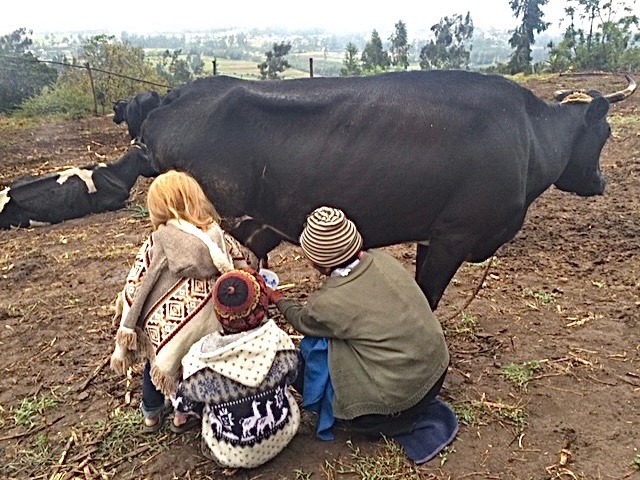Developing Worldschooling Curriculum: Longer Term Themes

An example: dairy value chain and animal husbandry
At the outset of our travels and periodically along the way, I asked each member of our family to identify one area of interest that they would like to explore from one place to another. These interests then helped guide our choice of destinations and activities, often leading us down obscure paths and to local people that we would not otherwise have encountered. Since one of our children had a keen interest in becoming a farmer and raising animals, for example, we made a point of seeking out opportunities to learn about this everywhere we went. As a result, over many years and continents, we got a good view of different philosophies and techniques for raising and milking cows, water buffalo, goats and sheep.
We kept the theme in mind and sought out ways to advance our knowledge about it almost everywhere we went. For instance:
- In Costa Rica, we asked around in a village where we were staying and found a dairy farm where we volunteered each morning for a few weeks to help with milking the cows. At this farm, the calves were used to start the mother’s milk flow, and then we helped the farmer separate mother and calf, and attach a milking machine.
- In Ecuador, we stayed for a few weeks on an indigenous kichwa farm, where we helped with the farm chores, including pasturing and milking the cows each morning, and corralling and leading them home in the evening. We helped the matriarch as she skimmed off hair and debris and surveyed the milk as it boiled, before partaking of the fresh, warm, pasteurized milk for breakfast.
- In Belgium, we stayed near a commercial dairy farm, where we walked to buy milk and watch operations several days a week. The farm had a milk machine set up, where our kids marveled at the cool, clean, frothy milk that filled our glass bottles brought from the home where we were staying.
- In the Philippines, we visited a university project focused on raising water buffalos for their nutrient-rich milk. We fed and visited with the animals, talked with the caretaking team about the animals’ care and diet, and got to enjoy chocolate buffalo milk and ice cream from the neighboring stand.
- In the Basque country of rural Spain, we stayed in a centuries old farmhouse beside a small family dairy farm. We saw a cow accidentally stumble onto her newborn calf’s leg while walking on the hill we looked out on, and the lame calf could not move from his spot on the grassy hill for a night and a day. We watched reverently as a truck came to haul the calf away and mourned with the mama cow at night as she mooed in sorrow, closed alone day and night in her barn by the farmer until she would “forget”. He explained to us that otherwise she would wander to the ends of the earth in search of her babe.
- In France, we did a farm-stay in Normandy where we learned about and pet their famous milk cows. We toured a Camembert cheese operation, seeing all the steps to produce the local cheese (that some of us loved while others found way too « stinky »).
- In the Alps, we visited friends with a sheep farm, observed their milking processes, and participated in making the local tomme de brebis cheese. This farm let mothers and babies roam together during daytime but separated them for the night to give the milk adequate time to accumulate before the morning milking.
- Later in France, our eldest bought his own female goat and tended to “Hops” and her sister « Cerisette » daily on the land of some friends. We took a class on making local goat cheese, and we planned to find a mate for the goats so that our son could try his hand at the cheesemaking. He cared for his goat for over a year before ultimately deciding to change directions before he got to the breeding and cheesemaking.
As a result of this intentional agro-tourism born from one child’s interest, we all got to witness and compare firsthand many practices and considerations related to dairy farming and animal husbandry on three continents. As a family, we participated in, talked with local people about and discussed as a family such issues as: separating babies from their mothers or keeping them together, milking by hand or with machinery, family versus factory farms, the ethics of consuming dairy products, and the joys, heartbreaks and realities of being an animal farmer. We complemented these experiences with documentaries like Cowspiracy to learn about the environmental impacts of the dairy industry and books on animal husbandry and the business of animal farming.
Weaving a theme like this throughout travels over the longer term is an exciting way to keep everyone engaged. Our son’s specific interest led us to fascinating people, farms and experiences, and the whole family got to learn with him as we compared dairy farm practices around the world. We pursued other themes for each family member with similar variety and eye-opening outcomes for everyone.
This video short offers a glimpse of our exploration of dairy farms on four continents.
Our daughter also pursued study of a longer-term theme: traditional dances around the world. This video short offers a glimpse of that experience.
0 Comments Add a Comment?